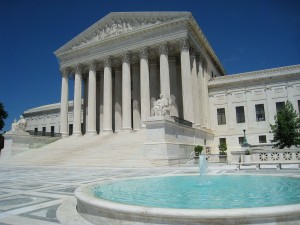Top Federal Crime Lawyer: Specialized Legal Defense for Federal Offenses
Top Federal Crime Lawyer: Specialized Legal Defense for Federal Offenses
Blog Article
Demystifying the Process of Federal Appeals: What You Need to Know
Navigating the complex world of government charms can commonly appear like going across undiscovered waters for those strange with the procedure. Recognizing the nuances of appellate court jurisdiction, the ins and outs of filing a notice of appeal, presenting a compelling brief, and making a persuasive oral disagreement are important parts that can considerably influence the outcome of an instance. By untangling the layers of intricacy bordering federal charms, people can gain a clearer insight into the mechanisms that control this critical point of the lawful system.
Understanding Federal Appeals Process
Digging right into the intricate world of the government charms procedure introduces a structured and methodical journey with the judicial system - federal white collar crime appeal lawyers. Federal appeals offer as a vital system for reviewing decisions made by lower courts. Comprehending this process is crucial for anyone included in legal proceedings at the federal degree
The procedure usually starts with a party dissatisfied with a lower court's ruling submitting a notification of appeal. This activates a review by a greater court, where a panel of judges evaluates the lawful disagreements presented by both events. Briefs detailing the lawful thinking behind each celebration's placement are sent, and oral disagreements might be heard to make clear complicated issues.
The appellate court's decision is based on a complete examination of the lower court's procedures and the debates offered. The judges do not reexamine truths however focus on whether legal errors happened that influenced the reduced court's choice. As soon as the appellate court gets to a choice, it can affirm, turn around, remand, or change the reduced court's judgment, providing clarity and finality to the legal dispute. Comprehending this process is essential for navigating the complexities of federal charms efficiently.
Appellate Court Jurisdiction Explained

Appellate courts have jurisdiction over particular sorts of situations, normally those entailing lawful mistakes, procedural problems, or inquiries of law as opposed to accurate disagreements. The jurisdiction of appellate courts is typically outlined in statutes and regulations that govern the court system. Comprehending appellate court jurisdiction is vital for events associated with the allures process as it determines whether a situation is qualified for evaluation and the level to which the appellate court can intervene in the reduced court's decision.
Declaring a Notice of Charm
The first action in beginning the federal allures procedure involves submitting a Notification of Allure with the ideal appellate court. arizona federal appellate lawyer. This vital document officially notifies the court and the other celebrations included in the case that the appealing party means to seek a testimonial of the reduced court's decision. Submitting a Notification of Appeal is a strict procedural demand that sets the appellate process in activity
When preparing the Notice of Charm, it is important to guarantee compliance with the particular policies and guidelines of the pertinent appellate court. The file needs to commonly include details such as the case name, the reduced court's name, the date of the judgment being appealed, and a concise declaration indicating the grounds for the charm.
Timeliness is of the essence when submitting a Notice of Charm. Missing the due date for sending this paper can result in the allure being rejected, underscoring the importance of timely and precise initiation of the charms procedure. It is advisable to seek lawful support to navigate the complexities of filing a Notice of Charm successfully.
Instruction and Oral Disagreement
In the appellate procedure, offering created briefs and engaging in dental disagreements play essential functions in advocating for the appealing party's position before the appellate court. Briefs are thorough lawful papers that lay out the events' debates, lawful authorities, and evaluation supporting their settings. These created entries give the court with a comprehensive understanding of the truths of the instance, the pertinent law, and why the appealing celebration believes the lower court's decision ought to be overturned.
Following the entry and testimonial of the briefs, oral arguments offer the parties a possibility to more clarify their positions, attend to any type visit homepage of concerns the appellate judges may have, and highlight key factors from their composed briefs. Oral arguments are an opportunity for the lawyers to encourage the courts via spoken advocacy and reactions to inquiries from the bench.

Obtaining the Appellate Court Choice

Conclusion
In verdict, the federal allures process is a complex yet important step in looking for justice. Comprehending the appellate court territory, submitting a notice of charm, preparing briefs, and offering oral arguments are all vital parts of this process. Inevitably, receiving the appellate court decision can give clarity and resolution to legal conflicts. It is vital to navigate the government appeals procedure with diligence and interest to detail to accomplish a reasonable outcome.
As we proceed from recognizing the federal appeals process to studying the ins and outs of appellate court jurisdiction, a fundamental element comes to light relating to the authority and limits of these greater courts in the lawful landscape. Appellate court jurisdiction refers to the range of situations that a particular appellate court has the power to evaluate and determine upon. Unlike test courts that listen to situations for the first time, appellate courts are restricted to reviewing choices made by reduced courts. Recognizing appellate court territory is critical for events entailed in the charms procedure as it establishes whether an instance is qualified for testimonial and the level to which the appellate court can interfere in the reduced court's decision.
Whether the appellate court affirms, turns around, or remands the reduced court's decision, understanding the ramifications of the ruling is vital for all events entailed in the appellate procedure.
Report this page